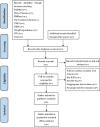The effect of acupuncture on postpartum stress urinary incontinence: A protocol for systemic review and meta-analysis
- PMID: 35866780
- PMCID: PMC9302277
- DOI: 10.1097/MD.0000000000029177
The effect of acupuncture on postpartum stress urinary incontinence: A protocol for systemic review and meta-analysis
Abstract
Background: Postpartum stress urinary incontinence (PSUI) is a widespread complaint in postpartum women, which significantly affects their quality of life. Acupuncture has been widely used as an alternative complementary therapy for the treatment of PSUI. This protocol is carried out to comprehensively explore the effectiveness and safety of acupuncture for treating PSUI.
Methods: Randomized clinical trials related to acupuncture treatment of PSUI will be searched in Chinese and English literature databases: PubMed, Web of Science, EMBASE, Cochrane Central Register of Controlled Trials, Chinese National Knowledge Infrastructure, Chinese Biomedical Literature Database, Wanfang Database, and the Technology Periodical Database. Changes in pelvic floor muscle strength compared with baseline will be accepted as the primary outcomes, and secondary outcomes will be the International Consultation on Incontinence Questionnaire-Urinary Incontinence Short Form score, the urodynamic indexes, the incontinence quality of life questionnaire, and adverse effects of acupuncture. All publications will be screened and extracted by 2 reviewers independently. Quality of the eligible publications will be assessed according to the Cochrane Risk of Bias tool and statistical analyses will be conducted by using the Review Manager V.5.3.
Results: This study will provide a high-quality comprehensive evaluation for the clinical efficacy and safety of acupuncture for PSUI.
Conclusion: This systematic review will provide comprehensive evidence of acupuncture treatment on specific outcomes for PSUI.
Ethics and dissemination: Because of the study will not collect personal information, ethical approval will not be required. The results will be published in a peer-reviewed journal.
Trial registration: INPLASY 202220045.
Copyright © 2022 the Author(s). Published by Wolters Kluwer Health, Inc.
Conflict of interest statement
The authors have no conflicts of interest to disclose.
Figures
Similar articles
-
The acupuncture-related therapy for post-stroke urinary incontinence: A protocol for systematic review and network meta-analysis.Medicine (Baltimore). 2020 Oct 30;99(44):e22865. doi: 10.1097/MD.0000000000022865. Medicine (Baltimore). 2020. PMID: 33126332 Free PMC article.
-
The effect of acupuncture on condition being studied emotional disorders in patients with postpartum: A protocol for systematic review and meta-analysis.Medicine (Baltimore). 2022 Jan 28;101(4):e28669. doi: 10.1097/MD.0000000000028669. Medicine (Baltimore). 2022. PMID: 35089211 Free PMC article.
-
Acupuncture combined with pelvic floor rehabilitation training for postpartum stress urinary incontinence: A systematic review and meta-analysis.Clin Rehabil. 2025 May;39(5):618-631. doi: 10.1177/02692155251324585. Epub 2025 Mar 11. Clin Rehabil. 2025. PMID: 40069127
-
Efficacy and safety of moxibustion in the treatment of female stress urinary incontinence: A protocol for systematic review and meta-analysis.Medicine (Baltimore). 2022 Feb 18;101(7):e28893. doi: 10.1097/MD.0000000000028893. Medicine (Baltimore). 2022. PMID: 35363208 Free PMC article.
-
Efficacy and safety of acupuncture therapy for urinary incontinence in women: A systematic review and meta- analysis.Medicine (Baltimore). 2019 Oct;98(40):e17320. doi: 10.1097/MD.0000000000017320. Medicine (Baltimore). 2019. PMID: 31577726 Free PMC article.
Cited by
-
Efficacy of Electroacupuncture in the Treatment of Mild to Moderate Female Stress Urinary Incontinence: Protocol for a Systematic Review and Network Meta-Analysis.JMIR Res Protoc. 2024 Nov 4;13:e55870. doi: 10.2196/55870. JMIR Res Protoc. 2024. PMID: 39496309 Free PMC article.
References
-
- Abrams P, Cardozo L, Fall M, et al. . The standardisation of terminology in lower urinary tract function: report from the standardisation sub-committee of the International Continence Society. Urology 2003;61:37–49. - PubMed
-
- Gonzales AL, Barnes KL, Qualls CR, et al. . Prevalence and treatment of postpartum stress urinary incontinence: a systematic review. Female Pelvic Med Reconstr Surg 2021;27:e139–45. - PubMed
-
- Mac Arthur C, Wilson D, Herbison P, et al. . Urinary incontinence persisting after childbirth: extent, delivery history, and effects in a 12-year longitudinal cohort study. BJOG 2016;123:1022–9. - PubMed
-
- Dolan LM, Hilton P. Obstetric risk factors and pelvic floor dysfunction 20 years after first delivery. Int Urogynecol J 2010;21:535–44. - PubMed
MeSH terms
LinkOut - more resources
Full Text Sources
Medical


